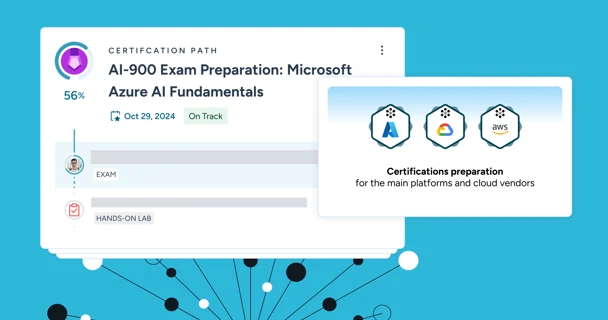
Agile Project Manager
Agile Project Managers play a vital role in ensuring teams deliver projects effectively, whilst embracing and implementing agile principles. Learn more about the skills and training needed to excel in this role.

Role profile

What does an agile project manager do?
The Agile Project Manager (APM) plays a vital role in Agile environments, ensuring that teams deliver value effectively while embracing Agile principles.
Unlike traditional project managers, APMs focus on facilitating Agile teams rather than enforcing rigid project plans. They balance Agile delivery with stakeholder needs, ensuring that projects align with business goals while promoting on time delivery, flexibility, collaboration, and continuous improvement.
What are the key skills required to be an agile project manager?
- Agile Methodology Expertise - Strong knowledge of Agile frameworks like AgilePM, PRINCE2 Agile, Scrum, and Kanban.
- Project Planning & Adaptability – Ability to balance Agile flexibility with project timelines and business objectives.
- Risk Management & Issue Resolution – Identifying risks early and enabling teams to proactively address challenges.
- Collaboration & Stakeholder Engagement – Facilitating communication between teams, executives, and customers.
- Metrics & Continuous Improvement – Using Agile metrics to drive efficiency and iterative progress.
- Leadership & Servant Leadership – Leading by empowering teams rather than dictating tasks.
- Backlog & Delivery Oversight – Working with Product Owners to prioritize work and maintain delivery flow.
Why do businesses need agile project managers?
Agile Project Managers are essential in environments where adaptability, collaboration, and incremental value delivery are priorities. They ensure that Agile teams stay focused, remove blockers, and continuously improve.
Without them, organizations may struggle with misalignment, inefficient processes, and resistance to Agile adoption.
What are the key responsibilities of an agile project manager?
- Ensuring effective and timely communication with project governance authorities (Business Sponsor, project board, steering committee, etc.) and stakeholders with appropriate and agreed frequency and formality.
- Collaborating project-wide to evolve and enact high-level project plans and schedules, but not the detailed planning—that is the responsibility of self-organizing teams.
- Monitoring progress against the baselined Delivery Plan.
- Identifying and owning risks associated with project delivery, including project organization, schedule, and internal and external dependencies.
Which roles are similar to agile project manager?
An agile project manager may also be known as, or have similar responsibilities to these roles:
- Product Manager
- Scrum Master
- Project Manager
- Product Owner
How can QA support with agile project manager training?
We offer an extensive portfolio of project management training and agile courses, with courses delivered by our team of specialist trainers.
We also partner with a number of leading organizations, such as APM, APMG, PRINCE2, MSP, BCS and more, to deliver all popular agile project management certifications.
We help individuals to gain relevant certifications and support organizations in training the project managers of tomorrow, as well as supporting them in adopting a more agile approach.
Agile PM insights
Average UK salary
job postings in the last 12 months
How to become an agile project manager
To become an agile project manager, you can take a course to become certified and gain the required skills.
We offer a range of accredited agile project management training, as well as courses covering the key skills you need to succeed as an agile PM.

APMG Agile Project Management Foundation and Practitioner - AgilePM
This five-day accredited course provides participants with a thorough grounding in the DSDM Agile Project Management framework. It is comprised of a Foundation-level introduction to the framework, and an in-depth Practitioner-level examination of how a project manager applies the framework.

PRINCE2® Agile Foundation Certificate
PRINCE2 Agile Foundation is a newly developed certification level to support PRINCE2 Agile. The new qualification will fit within the existing content scheme and is intended as another route for candidates to take PRINCE2 Agile Practitioner.
Learn key agile project management skills
As well as certifications, we also offer training in a number of other relevant specialisms.
Become a certified risk manager
Management of Risk (M_o_R 4) is designed to help you establish an effective framework for risk management, enabling you to make informed decisions about the risks that affect any of your strategic, portfolio, program, project, product, and operational objectives.
Train in business analysis
This course bridges the gap between Project Management and Business Analysis. It will extend the Project Manager's viewpoint to understand and facilitate excellent analysis and high quality requirements to deliver a fully formed solution, as well as delivering the project.
Learn budgeting and cost control
This course is suitable for managers, potential project managers, work-stream leaders or team members who wish to gain an insight into effective budgeting and cost control principles.
Improve stakeholder management
The ability to engage with a wide range of stakeholders has become an increasingly important competence in many roles - in particular, agile project management.
Improve your influencing skills
This short session offers you a chance to explore the concepts of influence and persuasion through a mixture of theoretical understanding, activity and discussion. The session will equip with you with awareness of personal power and persuasion.
Boost your decision making skills
This ½ day session is suitable for anyone who has to solve problems and make decisions in their organization. Project managers, line managers and those who are interested in making improvements within their area of work will benefit from attending.
Improve your time management
This session will help you understand your time management strengths and weaknesses, as well as giving you powerful tools to manage your time more efficiently, becoming more effective and productive.
Insights from the experts
"Agile Project Managers are the backbone of Agile delivery. They balance structure with flexibility, remove obstacles, and foster high-performing teams. Their ability to align business goals with Agile execution determines the success of projects and overall organizational agility."
Paddy Dhanda , Portfolio Director - Product Discovery, Design & Agile

Useful reads

Let's talk
Start your digital transformation journey today
Contact us today via the form or give us a call

